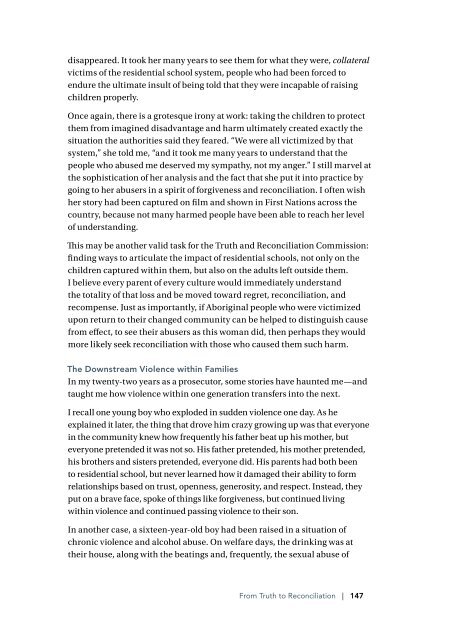Rupert Ross - Speaking My Truth
Rupert Ross - Speaking My Truth
Rupert Ross - Speaking My Truth
Create successful ePaper yourself
Turn your PDF publications into a flip-book with our unique Google optimized e-Paper software.
disappeared. It took her many years to see them for what they were, collateralvictims of the residential school system, people who had been forced toendure the ultimate insult of being told that they were incapable of raisingchildren properly.Once again, there is a grotesque irony at work: taking the children to protectthem from imagined disadvantage and harm ultimately created exactly thesituation the authorities said they feared. “We were all victimized by thatsystem,” she told me, “and it took me many years to understand that thepeople who abused me deserved my sympathy, not my anger.” I still marvel atthe sophistication of her analysis and the fact that she put it into practice bygoing to her abusers in a spirit of forgiveness and reconciliation. I often wishher story had been captured on film and shown in First Nations across thecountry, because not many harmed people have been able to reach her levelof understanding.This may be another valid task for the <strong>Truth</strong> and Reconciliation Commission:finding ways to articulate the impact of residential schools, not only on thechildren captured within them, but also on the adults left outside them.I believe every parent of every culture would immediately understandthe totality of that loss and be moved toward regret, reconciliation, andrecompense. Just as importantly, if Aboriginal people who were victimizedupon return to their changed community can be helped to distinguish causefrom effect, to see their abusers as this woman did, then perhaps they wouldmore likely seek reconciliation with those who caused them such harm.The Downstream Violence within FamiliesIn my twenty-two years as a prosecutor, some stories have haunted me—andtaught me how violence within one generation transfers into the next.I recall one young boy who exploded in sudden violence one day. As heexplained it later, the thing that drove him crazy growing up was that everyonein the community knew how frequently his father beat up his mother, buteveryone pretended it was not so. His father pretended, his mother pretended,his brothers and sisters pretended, everyone did. His parents had both beento residential school, but never learned how it damaged their ability to formrelationships based on trust, openness, generosity, and respect. Instead, theyput on a brave face, spoke of things like forgiveness, but continued livingwithin violence and continued passing violence to their son.In another case, a sixteen-year-old boy had been raised in a situation ofchronic violence and alcohol abuse. On welfare days, the drinking was attheir house, along with the beatings and, frequently, the sexual abuse ofFrom <strong>Truth</strong> to Reconciliation | 147

















